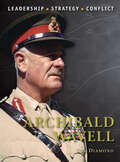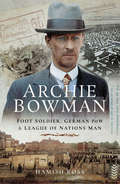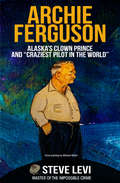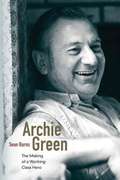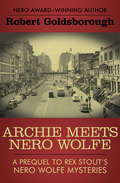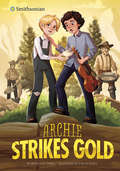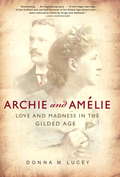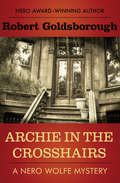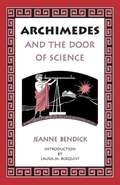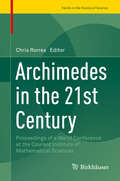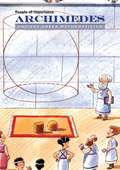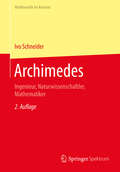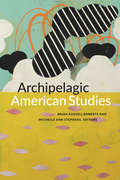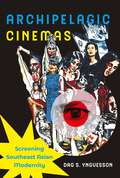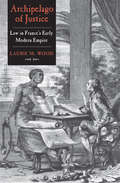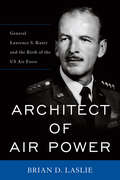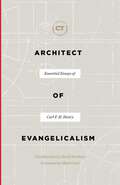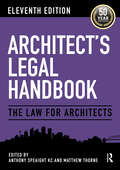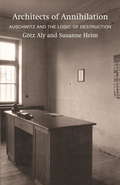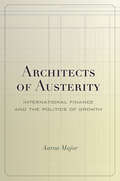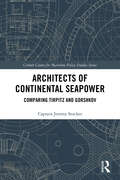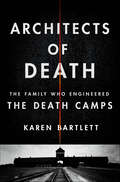- Table View
- List View
Archibald Wavell
by Peter Dennis Jon DiamondArchibald Wavell remains one of the great Allied commanders of the early phases of World War II. In fact, between June 1940 and June 1941, he was the only British theatre commander actively engaging Axis forces. At a time when the British Expeditionary Force had been expelled from the European continent and the home isles were preparing as best they could for the threat of a Nazi invasion, Wavell was conducting campaigns across nine countries and parts of two continents. In those 12 months, Wavell planned and directly oversaw a multitude of campaigns, from the hugely successful winter campaigns against the Italians in the Western Desert and the conquest of Italian East Africa, through the Iraqi revolt, the invasion of Vichy Syria and Lebanon and the ill-fated British involvement in Greece to the unsuccessful attempts to break the siege of Tobruk that led to his replacement in June 1941. He then took command of all Allied forces in the Burma theatre, leading the desperate and doomed defence against the Japanese offensive. While Wavell's great victories are often overshadowed by those of other commanders later in the war, this should not detract from his proven abilities as a strategist and tactician. This book tells the complete story of Wavell's wartime exploits and examines his strengths and weaknesses as a commander.
Archie Bowman: Foot Soldier, German POW and League of Nations Man
by Hamish RossIn 1915, Archie Bowman, a philosophy professor at Princeton, was granted leave of absence to join the British army. He served in the HLI and was captured at the Battle of the Lys.Prison camp, though, turned out not to be the living death he expected: he was fluent in German and became the main go-between with camp authorities and British prisoners; he gave talks to hundreds of prisoners, and wrote up in verse form his account of the battle and his capture and two-day march into captivity. When he was transferred to another camp, his writings were confiscated; but in his new camp his responsibilities increased, and he became key negotiator and formed a bond with the Commandant, a fellow academic, who secured the release of his confiscated work, which, when completed, was published as prison camp verses.After the Armistice, he was posted to the British Army of the Rhine in Cologne, where he found his most interesting work in the service, interviewing German civilians wishing to travel into another Occupied Zone.Although Bowman didnt become a pacifist he was convinced more could be done to prevent wars; and he dedicated himself to the cause of peace and championed the ideal of the League of Nations, at the cost of his health.Based on the archived Bowman Papers, it is a fascinating story of a man of high principle and great depth of feeling who had the love and support of his wife Mabel.
Archie Ferguson: Alaska's Clown Prince and “Craziest Pilot in the World”
by Steve LeviArchie Ferguson is the last of the original fly-by-the-seat-of-your-pants Alaska bush pilots to be the subject of a biography. Dubbed Alaska's Clown Prince," he added many hilarious chapters to Alaska's history. He is also the originator of the "Arctic Bump," current practice of airline pilots who give a blast of power as they fly over the Arctic Circle to provide gullible tourists the impression that the air north of the Arctic Circle is different than air south of the Arctic Circle. His title, "the Craziest Pilot in the World, was given to him by The Saturday Evening Post in its December 1945 issue. Ferguson, who died in 1967, was an excellent example of the colorful character/con men who made Alaska what it is today."
Archie Green: The Making of a Working-Class Hero
by David Roediger Nick Spitzer Sean BurnsArchie Green: The Making of a Working-Class Hero celebrates one of the most revered folklorists and labor historians of the twentieth century. Devoted to understanding the diverse cultural customs of working people, Archie Green (1917-2009) tirelessly documented these traditions and educated the public about the place of workers' culture and music in American life. Doggedly lobbying Congress for support of the American Folklife Preservation Act of 1976, Green helped establish the American Folklife Center at the Library of Congress, a significant collection of images, recordings, and written accounts that preserve the myriad cultural productions of Americans. Capturing the many dimensions of Green's remarkably influential life and work, Sean Burns draws on extensive interviews with Green and his many collaborators to examine the intersections of radicalism, folklore, labor history, and worker culture with Green's work. Burns closely analyzes Green's political genealogy and activist trajectory while illustrating how he worked to open up an independent political space on the American Left that was defined by an unwavering commitment to cultural pluralism.
Archie Meets Nero Wolfe: A Prequel to Rex Stout's Nero Wolfe Mysteries (The Nero Wolfe Mysteries #8)
by Robert GoldsboroughAn &“excellent&” novel that goes back to 1920s New York to reveal how the famed detective first met his incomparable sidekick (Publishers Weekly, starred review). In 1930, young Archie Goodwin comes to New York City hoping for a bit of excitement. In his third week working as a night watchman, he stops two burglars in their tracks—with a pair of hot lead slugs. Dismissed from his job for being &“trigger-happy,&” he parlays his newfound notoriety into a job as a detective&’s assistant, helping honest sleuth Del Bascom solve cases like the Morningside Piano Heist, the Rive Gauche Art Gallery Swindle, and the Sumner-Hayes Burglary. But it&’s the kidnapping of Tommie Williamson, the son of a New York hotel magnate, that introduces Goodwin to the man who will change his life. Goodwin knows there&’s only one detective who can help find Tommie: Nero Wolfe, the stout genius of West Thirty-Fifth Street. Together, they&’ll form one of the most unlikely crime fighting duos in history—but first Goodwin must locate Tommie and prove that he deserves a place by Wolfe&’s side. In this witty story about the origin of a legendary partnership, Robert Goldsborough gloriously evokes the spirit of Nero Wolfe&’s creator, bestselling author Rex Stout, and breathes new life into his beloved characters.
Archie Meets Nero Wolfe: A Prequel to Rex Stout's Nero Wolfe Mysteries (The Nero Wolfe Mysteries #8)
by Robert GoldsboroughAn &“excellent&” novel that goes back to 1920s New York to reveal how the famed detective first met his incomparable sidekick (Publishers Weekly, starred review). In 1930, young Archie Goodwin comes to New York City hoping for a bit of excitement. In his third week working as a night watchman, he stops two burglars in their tracks—with a pair of hot lead slugs. Dismissed from his job for being &“trigger-happy,&” he parlays his newfound notoriety into a job as a detective&’s assistant, helping honest sleuth Del Bascom solve cases like the Morningside Piano Heist, the Rive Gauche Art Gallery Swindle, and the Sumner-Hayes Burglary. But it&’s the kidnapping of Tommie Williamson, the son of a New York hotel magnate, that introduces Goodwin to the man who will change his life. Goodwin knows there&’s only one detective who can help find Tommie: Nero Wolfe, the stout genius of West Thirty-Fifth Street. Together, they&’ll form one of the most unlikely crime fighting duos in history—but first Goodwin must locate Tommie and prove that he deserves a place by Wolfe&’s side. In this witty story about the origin of a legendary partnership, Robert Goldsborough gloriously evokes the spirit of Nero Wolfe&’s creator, bestselling author Rex Stout, and breathes new life into his beloved characters.
Archie Strikes Gold (Smithsonian Historical Fiction)
by Brandon TerrellArchie is traveling with his uncle Harold, a member of an entertainment revue hired by the renovated Dawson City Theatre, to perform for the Yukon gold rushers. While there, Harold befriends an older gentleman, Montgomery Wycroft, who is in the area panning for gold. Archie and his uncle opt to stay behind in Dawson City, joining Monty on his dangerous quest for gold, battling with both greedy gold-seekers and the unforgiving Canadian terrain. Will Archie and his uncle strike gold, or will they find something more valuable?
Archie and Amelie: Love and Madness in the Gilded Age
by Donna M. LuceyFilled with glamour, mystery, and madness, Archie and Amélie is the true story chronicling a tumultuous love affair in the Gilded Age. John Armstrong "Archie" Chanler was an heir to the Astor fortune, an eccentric, dashing, and handsome millionaire. Amélie Rives, Southern belle and the goddaughter of Robert E. Lee, was a daring author, a stunning temptress, and a woman ahead of her time. Archie and Amélie seemed made for each other—both were passionate, intense, and driven by emotion—but the very things that brought them together would soon tear them apart. Their marriage began with a “secret” wedding that found its way onto the front page of the New York Times, to the dismay of Archie’s relatives and Amélie’s many gentleman friends. To the world, the couple appeared charmed, rich, and famous; they moved in social circles that included Oscar Wilde, Teddy Roosevelt, and Stanford White. But although their love was undeniable, they tormented each other, and their private life was troubled from the start. They were the F. Scott and Zelda Fitzgerald of their day—a celebrated couple too dramatic and unconventional to last—but their tumultuous story has largely been forgotten. Now, Donna M. Lucey vividly brings to life these extraordinary lovers and their sweeping, tragic romance. “In the Virginia hunt country just outside of Charlottesville, where I live, the older people still tell stories of a strange couple who died some two generations ago. The stories involve ghosts, the mysterious burning of a church, a murder at a millionaire’s house, a sensational lunacy trial, and a beautiful, scantily clad young woman prowling her gardens at night as if she were searching for something or someone—or trying to walk off the effects of the morphine that was deranging her. I was inclined to dismiss all of this as tall tales Virginians love to spin out; but when I looked into these yarns I found proof that they were true. . . .” —Donna M. Lucey on Archie and Amélie
Archie and Amelie: Love and Madness in the Gilded Age
by Donna M. LuceyFilled with glamour, mystery, and madness, Archie and Amélie is the true story chronicling a tumultuous love affair in the Gilded Age. John Armstrong "Archie" Chanler was an heir to the Astor fortune, an eccentric, dashing, and handsome millionaire. Amélie Rives, Southern belle and the goddaughter of Robert E. Lee, was a daring author, a stunning temptress, and a woman ahead of her time. Archie and Amélie seemed made for each other—both were passionate, intense, and driven by emotion—but the very things that brought them together would soon tear them apart. Their marriage began with a “secret” wedding that found its way onto the front page of the New York Times, to the dismay of Archie’s relatives and Amélie’s many gentleman friends. To the world, the couple appeared charmed, rich, and famous; they moved in social circles that included Oscar Wilde, Teddy Roosevelt, and Stanford White. But although their love was undeniable, they tormented each other, and their private life was troubled from the start. They were the F. Scott and Zelda Fitzgerald of their day—a celebrated couple too dramatic and unconventional to last—but their tumultuous story has largely been forgotten. Now, Donna M. Lucey vividly brings to life these extraordinary lovers and their sweeping, tragic romance. “In the Virginia hunt country just outside of Charlottesville, where I live, the older people still tell stories of a strange couple who died some two generations ago. The stories involve ghosts, the mysterious burning of a church, a murder at a millionaire’s house, a sensational lunacy trial, and a beautiful, scantily clad young woman prowling her gardens at night as if she were searching for something or someone—or trying to walk off the effects of the morphine that was deranging her. I was inclined to dismiss all of this as tall tales Virginians love to spin out; but when I looked into these yarns I found proof that they were true. . . .” —Donna M. Lucey on Archie and Amélie
Archie in the Crosshairs: A Nero Wolfe Mystery (The Nero Wolfe Mysteries #10)
by Robert GoldsboroughMystery fans will devour this entry into the classic, wisecracking Nero Wolfe series, in which Wolfe must track down a dangerous gunman—or risk losing his right-hand man Archie Goodwin is chipper as he strolls home from his weekly poker game, money in his pocket and a smile on his lips. He has just reached Nero Wolfe&’s stately brownstone on West Thirty-Fifth Street when a sedan whips around the corner and two gunshots ring out, nearly hitting Goodwin. It is a warning, and the message is clear: The next bullet will not miss. Rotund investigator Nero Wolfe has made more than his fair share of enemies over the years, and it seems one of them has decided to strike, targeting Wolfe&’s indefatigable assistant. Some might run for cover, but Archie Goodwin is not the type. With the help of Wolfe&’s brainpower, Goodwin will find the man who wants him dead—unless the killer gets to Goodwin first. Nero Award–winning author Robert Goldsborough continues the brilliant work of Rex Stout in this classic mystery series. According to Publishers Weekly, &“Goldsborough cleverly captures the tone and language of the originals. Rex Stout fans can only hope he has no plans to wind up the series soon.&”
Archimedes and the Door of Science
by Jeanne BendickJeanne Bendick, through text and pictures, admirably succeeds in bringing to life the ancient Greek mathematician who enriched mathematics and all branches of science. Against the backdrop of Archimedes' life and culture, the author discusses the man's work, his discoveries and the knowledge later based upon it. The simple, often humorous, illustrations and diagrams greatly enhance the text.
Archimedes in the 21st Century: Proceedings of a World Conference at the Courant Institute of Mathematical Sciences (Trends in the History of Science)
by Chris RorresThis book is a collection of papers presented at the "Archimedes in the 21st Century" world conference, held at the Courant Institute of Mathematical Sciences in 2013. This conference focused on the enduring and continuing influence of Archimedes in our modern world, celebrating his centuries of influence on mathematics, science, and engineering. Archimedes planted the seeds for a myriad of seminal ideas that would grow over the ages. Each chapter surveys the growth of one or more of these seeds, and the fruit that they continue to bear to this day. The conference speakers contributing to this book are actively involved in STEM fields whose origins trace back to Archimedes, many of whom have conducted and published research that extends Archimedes' work into the 21st century. The speakers are not historians, so while historical context is provided, this book is uniquely focused on the works themselves as opposed to their history. The breadth and depth of Archimedes' influence will inspire, delight, and even surprise readers from a variety of fields and interests including historians, mathematicians, scientists, and engineers. Only a modest background in math is required to read this book, making it accessible to curious readers of all ages.
Archimedes: Ancient Greek Mathematician
by Susan KeatingModern life would be very different without the ideas of brilliant Greek scholar Archimedes. From the simple lever to complicated machines, his work in mathematics, physics, engineering, and astronomy helped to shape the world we live in today. Few thinkers of any time period have had as big an impact on math and science as the genius Archimedes. Learn the story of one of the most important mathematic thinkers of all time in Archimedes: Ancient Greek Mathematician.
Archimedes: Ingenieur, Naturwissenschaftler, Mathematiker (Mathematik im Kontext)
by Ivo SchneiderEin Meilenstein der Archimedes-Forschung wieder verfügbar! Ausgestattet mit einem umfangreichen neuen Vorwort, das auf die neueren Forschungsergebnisse eingeht, wird in diesem wegweisenden Werk die bis heute ungeklärte Kernfrage der Archimedes-Forschung behandelt: Ist Archimedes von der Praxis des Architekten, Geschütz- und Instrumentenbauers über die Mechanik zur Mathematik gekommen, oder hat er als Mathematiker die Mechanik zu einer mathematischen Disziplin gemacht, für die er später Anwendungen suchte? Über die Rekonstruktion des Lebens und des Werkes von Archimedes werden seine außermathematischen Aktivitäten und Leistungen mit denen des Mathematikers in einen Zusammenhang gebracht und so die z. T. auseinanderstrebende Ergebnisse der Forschung in den letzten Jahrzehnten harmonisiert. Durch seinen stringenten Aufbau führt das Buch bestens in die Biographie und das Werk von Archimedes ein und zeigt dabei auch, welche z. T. großen Erkenntnislücken wir heute noch über Archimedes haben.
Archipelagic American Studies
by Brian Russell Roberts Michelle Ann StephensDeparting from conventional narratives of the United States and the Americas as fundamentally continental spaces, the contributors to Archipelagic American Studies theorize America as constituted by and accountable to an assemblage of interconnected islands, archipelagoes, shorelines, continents, seas, and oceans. They trace these planet-spanning archipelagic connections in essays on topics ranging from Indigenous sovereignty to the work of Édouard Glissant, from Philippine call centers to US militarization in the Caribbean, and from the great Pacific garbage patch to enduring overlaps between US imperialism and a colonial Mexican archipelago. Shaking loose the straitjacket of continental exceptionalism that hinders and permeates Americanist scholarship, Archipelagic American Studies asserts a more relevant and dynamic approach for thinking about the geographic, cultural, and political claims of the United States within broader notions of America. Contributors Birte Blascheck, J. Michael Dash, Paul Giles, Susan Gillman, Matthew Pratt Guterl, Hsinya Huang, Allan Punzalan Isaac, Joseph Keith, Yolanda Martínez-San Miguel, Brandy Nalani McDougall, Ifeoma Kiddoe Nwankwo, Craig Santos Perez, Brian Russell Roberts, John Carlos Rowe, Cherene Sherrard-Johnson, Ramón E. Soto-Crespo, Michelle Ann Stephens, Elaine Stratford, Etsuko Taketani, Alice Te Punga Somerville, Teresia Teaiwa, Lanny Thompson, Nicole A. Waligora-Davis
Archipelagic Cinemas: Screening Southeast Asian Modernity (Transpacific Studies)
by Dag S. YngvessonA free ebook version of this title is available through Luminos, University of California Press's Open Access publishing program. Visit www.luminosoa.org to learn more.Archipelagic Cinemas compares trajectories of cinematic and political development across Southeast Asia from the mid-twentieth century to the present, taking the Indonesian island of Java as a key point of departure. Its "archipelagic" approach reflects a region of tanah air (land-water) where strategies of communication are shaped by the inevitability of difference and constant change. Archipelagic Cinemas foregrounds the outgrowth of local motion pictures from established regional modes of expression, such as touring vernacular theaters, known for their improvised assemblies of narratives and aesthetics from diverse places and times. Similarly, Southeast Asian movies have distinguished themselves by rejecting the imposition of a single, sovereign, or necessarily masculine point of reference. Filmmakers respond to political and social shifts with populist shows of unruliness, mockery, and often horror while challenging binary interpretations of good and evil, self and other, and on- and off-screen space. A common cinematic "matrifocal gaze" takes the blurring of women's and men's roles in the region as a tool of engagement with nationalist contests over gender and power. Together, regional cinemas set the stage for a multifarious modern visuality rooted in the unique, intertwined histories of Southeast Asian nations.
Archipelago of Justice: Law in France's Early Modern Empire
by Laurie M. WoodAn examination of France’s Atlantic and Indian Ocean empires through the stories of the little-known people who built it This book is a groundbreaking evaluation of the interwoven trajectories of the people, such as itinerant ship-workers and colonial magistrates, who built France’s first empire between 1680 and 1780 in the Atlantic and Indian Oceans. These imperial subjects sought political and legal influence via law courts, with strategies that reflected local and regional priorities, particularly regarding slavery, war, and trade. Through court records and legal documents, Wood reveals how courts became liaisons between France and new colonial possessions.
Architect of Air Power: General Laurence S. Kuter and the Birth of the US Air Force (American Warriors Series)
by Brian D. LaslieA biography of the pioneering four-star general, chronicling his influence on the United States Air Force.At age 36, Laurence S. Kuter (1905–1979) became the youngest general officer since William T. Sherman. He served as deputy commander of allied tactical air forces in North Africa during World War II and helped devise the American bombing strategy in Europe. Although his combat contributions were less notable than other commanders in the Eighth Air Force, few officers saw as many theaters of operation as he did or were as highly sought-after. After World War II, he led the Military Air Transport Service, Air University, Far East Air Forces, and served as commander-in-chief of the North American Air Defense Command (NORAD). Despite these accomplishments and others, however, Kuter remains widely underappreciated.In Architect of Air Power, Brian D. Laslie offers the first biography of this important but unsung pioneer whose influence can be found in every stage of the development of an independent US Air Force. From his early years at West Point to his days at the Air Corps Tactical School to his leadership role at NORAD, Kuter made his mark with quiet efficiency. He was an early advocate of strategic bombardment rather than pursuit or fighter aviation?fundamentally changing the way air power was used?and later helped implement the Berlin airlift in 1948. In what would become a significant moment in military history, he wrote Field Manual 100-20, which is considered the Air Force’s “declaration of independence” from the Army.Drawing on diaries, letters, and scrapbooks, Laslie offers a complete portrait of this influential soldier. Architect of Air Power illuminates Kuter’s pivotal contributions and offers new insights into critical military policy and decision-making during the Second World War and the Cold War.Praise for Architect of Air Power“Laslie expertly brings into focus perhaps the least known of the major Air Force personalities of World War II and the early Cold War. Kuter was the indispensable “behind-the-scenes” man in those years, and this book fills a similarly indispensable gap in our understanding of the people and ideas that propelled the nation’s air arm to independence and prominence.” —Thomas Alexander Hughes, author of Over Lord: General Pete Quesada and the Triumph of Tactical Air Power in World War II“Laslie’s outstanding work on Laurence Kuter is the first full and highly effective look at this exceptionally important airman. It gives the reader ample evidence of Kuter’s central role in making America the quintessential airpower nation during the course of the twentieth century. This will be the book on Kuter for many years to come.” —Robert S. Ehlers, Jr., author of The Mediterranean Air War: Airpower and Allied Victory in World War II
Architect of Evangelicalism: Essential Essays of Carl F. H. Henry (Best of Christianity Today)
by Carl F. H. HenryDiscover the ongoing relevance of the essential evangelical. In recent years, the label "evangelical" has been distorted and its usefulness questioned. No one is better equipped to provide a clear understanding of evangelicalism than the late Carl F. H. Henry, the founding editor of Christianity Today and the most influential theologian of American evangelicalism in the twentieth century. While Billy Graham was preaching the gospel to stadiums full of people, Henry was working tirelessly to help Christians adopt a worldview that encompasses all of life. Architect of Evangelicalism helps us gain a better sense of the roots of American evangelicalism by giving us the best of Henry's Christianity Today essays on subjects such as what defines evangelicalism, what separates it from theological liberalism, what evangelical Christian education should look like, and how evangelicals should engage with society.
Architect's Legal Handbook: The Law for Architects
by Anthony Speaight Matthew ThorneCelebrating 50 years since it was first published, the Architect’s Legal Handbook has been the most widely used reference on the law for practicing architects, and the established textbook on law for architectural students. Since the last edition of this book in 2021, unprecedented change has occurred in the construction sector. The withdrawal of the United Kingdom from the European Union has ushered in changes to legislation in a wide range of areas. The tragic fire at Grenfell Tower in June 2017 and the deficiencies in design, construction, and regulation within the sector that were revealed as a result have given rise to major changes in the way projects are now carried out. An overhaul of the Building Regulations and the creation of a new Building Safety Regulator are only some of the ways in which the landscape has changed. This eleventh edition features all the latest developments in the law which affect an architect’s work, as well as providing comprehensive coverage of relevant UK law topics. Key highlights of this edition include: A new chapter has been added to cover the statutory framework for building safety (Chapter 9), which is complemented by a wholly updated chapter on construction regulation in England and Wales (Chapter 10). The chapter on public procurement law (Chapter 14) has also been entirely rewritten to focus on the Public Procurement Act 2023 and related regulations, following Brexit. New suites of standard contract forms have, since the last edition, been issued. These have seen substantial changes with chapters on JCT 2024 (Chapter 18) and the latest NEC4 forms (Chapter 19), together with wider updates to the chapters on FIDIC (Chapter 20) and other forms of contract (Chapter 21). A revised chapter on architects’ contracts with clients covering the RIBA Professional Services Contract 2024 (Chapter 37). A new section on novations in the chapter on the English Law of Contract (Chapter 2). The Architect’s Legal Handbook is the essential legal reference work for all architects and students of architecture.
Architects of Annihilation: Auschwitz and the Logic of Destruction
by Gotz Aly Susanne HeimArchitects of Annihilation follows the activities of the demographers, economists, geographers and planners in the period between the disorderly excesses of the November 1938 pogrom and the fully-effective operation of the gas chambers at Auschwitz in summer 1942. The authors, both journalists and historians, argue that this group of intellectuals, often combining academic, civil service and Party functions, made an indispensable contribution to the planning and execution of the Final Solution. More than that, in the economic and demographic rationale of these experts, the Final Solution was only one element in a far-reaching programme of self-sufficiency which privileged the German Aryan population.
Architects of Annihilation: Auschwitz and the Logic of Destruction
by Gotz Aly Susanne HeimArchitects of Annihilation follows the activities of the demographers, economists, geographers and planners in the period between the disorderly excesses of the November 1938 pogrom and the fully-effective operation of the gas chambers at Auschwitz in summer 1942. The authors, both journalists and historians, argue that this group of intellectuals, often combining academic, civil service and Party functions, made an indispensable contribution to the planning and execution of the Final Solution. More than that, in the economic and demographic rationale of these experts, the Final Solution was only one element in a far-reaching programme of self-sufficiency which privileged the German Aryan population.
Architects of Austerity: International Finance and the Politics of Growth
by Aaron MajorArchitects of Austerity argues that the seeds of neoliberal politics were sown in the 1950s and 1960s. Suggesting that the postwar era was less socially democratic than we think, Aaron Major presents a comparative-historical analysis of economic policy in the United States, the United Kingdom, and Italy during the early 1960s. In each of these cases, domestic politics shifted to the left and national governments repudiated the conservative economic policies of the past, promising a new way forward. Yet, these social democratic experiments were short-lived and deeply compromised. Why did the parties of change become the parties of austerity? Studies of social welfare policy in these countries have emphasized domestic factors. However, Major reveals that international social forces profoundly shaped national decisions in these cases. The turn toward more conservative economic policies resulted from two critical shifts on the international stage. International monetary organizations converged around an orthodox set of ideas, and a set of institutional transformations within the Bretton Woods system made the monetary community more central to financial management. These changes gave central banks and treasuries the capacity to impose their ideas on national governments. Architects of Austerity encourages us to critically consider the power that we vest in public financial authorities, which have taken on an ever larger role in international economic regulation.
Architects of Continental Seapower: Comparing Tirpitz and Gorshkov (Corbett Centre for Maritime Policy Studies Series)
by Jeremy StockerThis book describes and analyses two iconic figures in twentieth-century naval history: the German Admiral Alfred von Tirpitz and the Russian Admiral Sergei Gorshkov. It examines the men, what they thought and wrote about seapower, the fleets they created and the strategic consequences of what they did. More broadly, it draws on the respective histories of the post-1897 Imperial German Navy and the post-1956 Soviet Navy to examine the continental bid for large-scale seapower. The work argues that both individuals built navies that did not, and could not, fulfil the objectives for which they were created. Drawing on the legacies of both men, the book also develops some wider ideas about the creation of large navies by continental states, with cautionary lessons for today’s emerging powers, India and China. Both admirals have received book-length biographies, but this is the first attempt at a comparative study and the first to draw broader strategic lessons from their respective attempts as continental navalists to challenge maritime states. This book will be of much interest to students of naval history, strategic studies and International Relations.
Architects of Death: The Family Who Engineered the Death Camps
by Karen BartlettA sobering story of an industrial family’s cold efficiency behind the design of the ovens at AuschwitzArchitects of Death tells the astonishing story of how the gas chambers and crematoria that facilitated the murder and incineration of more than one million people in the Holocaust were designed not by the Nazi SS, but by a small respectable family firm of German engineers. Topf and Sons designed and built the crematoria at the concentration camps at Auschwitz-Birkenau, Buchenwald, Belzec, Dachau, Mauthausen, and Gusen. At its height, 66 Topf triple muffle ovens were in operation—46 of which were at Auschwitz. These were not Nazi sadists, but men who were playboys and the sons of train conductors. They were driven not by ideology, but by love affairs, personal ambition, and bitter personal rivalries. Even while their firm created the ultimate human killing and disposal machines, their company sheltered Nazi enemies from the death camps. The intense conflagration of their very ordinary motives created work that surpassed in inhumanity even the demands of the SS. But the company that achieved this spectacularly evil feat of engineering typify the banality of evil. In the 1930s their family firm produced apparatus for all sorts of industries—baking, brewing, the firing of ceramics. Ovens for crematoria accounted for only a small proportion of their business, but it is for these that the Topf brothers became infamous. Their name can still be seen stamped on the iron furnaces of Auschwitz.
